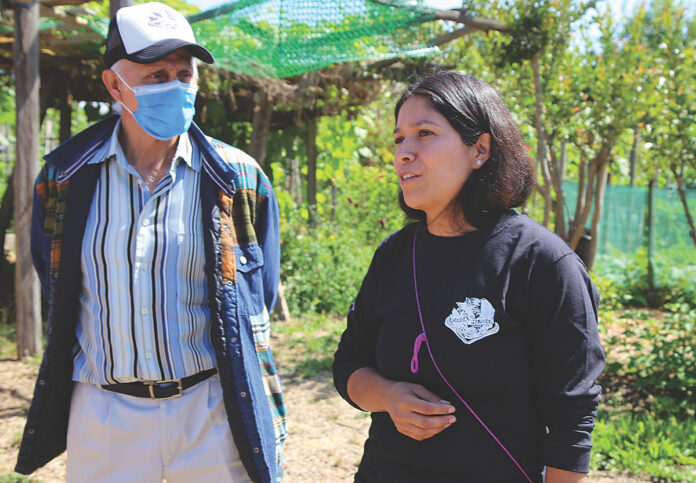
WATSONVILLE—For more than a decade, dozens of families have grown their own produce on a one-acre community garden located on the property of All Saints Episcopal Church in Watsonville.
The 50 or so crops include corn, peppers, tomatoes and tomatillos, in addition to several fruit trees.
The garden for four years has been run by an organization called Tierras Milperas.
The group, which is run by its own governance structure, was formed two years ago to better oversee the All Saints garden and six others throughout Watsonville.
That group’s future at the All Saints site was cast into doubt on June 2 when the church informed them their lease was being canceled as of Aug. 1.
Tierras Milperas currently pays $2,000 per year for rent, and roughly the same amount goes to the monthly water bill.
Both the church and Episcopal Diocese of El Camino Real that oversees it cite “suspicious activity” taking place at the site, saying that neighbors call in to complain about such issues as drug paraphernalia and unauthorized people loitering in the area.
The church is also concerned about who is using the garden.
Rev. Lawrence Robles says that he has never received a list of the families who have plots, and therefore has no way of confirming when anyone has a legitimate reason to be there.
Describing the church’s move as a “reset,” Robles says that new leadership will be chosen after that issue is resolved.
“The bishops’ committee and I have determined that it’s not a safe place right now,” he said. “I just want to bring order to the chaos, figure who belongs on the property.”
Robles stresses that anyone who has crops in the garden will be allowed to harvest them, for as long as it takes to do so. He also says that those families can likely return for future growing seasons.
The church, Robles adds, has no plans to develop the property.
“Right now our vision is to clean it up, make it safe and invite local families to come and garden,” he said. “For us it’s going to continue being a garden. Once we bring order and safety for the families, we will open it back up to the community.”
Tierras Milperas was formed by campesino families, most of whom spend their days working in the agricultural fields.
“We grow our own food because of the love of family and mother earth,” says Eliodoro Martinez, farmer and member of Tierras Milpera’s Council of Elders. “After working in the industrial agricultural fields, where chemicals destroy the soil and contaminate the water, we come to our garden to cultivate and gather with other families, to enjoy rest from the toil of the fields, and do so with great effort in search of our family’s well being.”
The group holds community meetings for its gardeners at least once a month, where topics such as garden rules are discussed, expenditures are outlined and gardening knowledge is shared.
Members also hold potluck meals, using produce grown in the garden.
“This is the space where everyone gets to know each other,” said community coordinator Hugo Nava, pointing to a small shaded gathering space at the rear of the garden.
Nava says he is perplexed by allegations of crime and suspicious activity at the garden.
“I have never seen anything like that, especially at this garden,” he said.
The only complaint Nava has heard, he says, is from a neighbor who didn’t like the look of a port-a-potty stationed in the garden.
In fact, he adds, gardeners often get to know the neighbors and sometimes share their produce with them, he says.
Church leadership says that Tierras Milperas—and its umbrella organization Community Agroecology Network—have refused to meet to discuss the issue. Those organizations reject this claim, saying it is the church and the Diocese that have refused multiple requests for meetings.
“We would like to have a process of truth and reconciliation,” said Tierras Milperas member Carmen Cortez. “We are asking not to get evicted. This land is important to us. We take care of it. We learn from each other and we want to keep doing that.”
Gardener Centarino Peña, who serves on the Council of Elders, says he enjoys the peace and tranquility of the garden. He also says that everyone involved keeps a close watch on the property, to keep it safe for the families and children.
That includes telling people they see loitering to move along, he says.
“We feel saddened with all that is happening,” he said through a translator. “We want this to be a safe place.”










